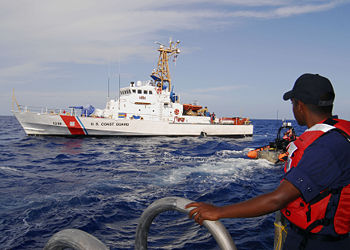USCG Island class: Difference between revisions
imported>George Swan (fix refs) |
imported>Sean Plankey mNo edit summary |
||
| Line 14: | Line 14: | ||
Initially the first eight vessels to be modernized were described as a success. | Initially the first eight vessels to be modernized were described as a success. | ||
But later it emerged that the lengthened stern were structurally unsound, and the converted vessels were unseaworthy.<ref name=ThadAllen123Failure> | But later it emerged that the lengthened stern were structurally unsound, and the converted vessels were unseaworthy.<ref name=ThadAllen123Failure> | ||
{{cite news | {{cite news | ||
| url=https://www.piersystem.com/go/doc/786/154307/ | | url=https://www.piersystem.com/go/doc/786/154307/ | ||
| Line 45: | Line 45: | ||
The conversion had also gone several multiples over-budget. | The conversion had also gone several multiples over-budget. | ||
In 2007 the Coast Guard took over direct control of the Deepwater Program from the | In 2007 the Coast Guard took over direct control of the Deepwater Program from the | ||
Prime Contractor.<ref name=DefenseIndustryDaily20070418> | Prime Contractor. All current 123' cutters are now still in commission, but out of service.<ref name=DefenseIndustryDaily20070418> | ||
{{cite news | {{cite news | ||
| url=http://www.defenseindustrydaily.com/us-coast-guard-taking-over-lead-role-for-deepwater-program-03215/ | | url=http://www.defenseindustrydaily.com/us-coast-guard-taking-over-lead-role-for-deepwater-program-03215/ | ||
Revision as of 17:40, 14 July 2008

United States Coast Guard Island class Cutter Chandeleur, one of the unmodified 110 foot vessels.
The United States Coast Guard Island class of cutters included approximately five dozen vessels. As originally built these vessels were crewed with sixteen personnel, were armed with a 25mm autocannon, and were capable of speeds of approximately thirty knots.
Following al Qaeda's attacks on September 11, 2001, a plan called "Project Deepwater" was to modernize and re-equip the Coast Guard's fleet. The Island class cutters were to be lengthened from 110 to 123 feet.
The crew accommodation were to be modernized to comply with a new policy for all cutters to accommodate crews of mixed sex.
The lengthening was designed so the vessels could launch and retrieve a water-jet propelled rigid-hull infatable Short Range Prosecutor high speed pursuit boat, without coming to a halt first.
Initially the first eight vessels to be modernized were described as a success. But later it emerged that the lengthened stern were structurally unsound, and the converted vessels were unseaworthy.[1][2][3] The conversion had also gone several multiples over-budget. In 2007 the Coast Guard took over direct control of the Deepwater Program from the Prime Contractor. All current 123' cutters are now still in commission, but out of service.[4]
Forty-nine of the original Island class vessels remain in active service. The unmodified vessels still have to come to a halt to launch a boat.
References
- ↑ Thad Allen. STATEMENT BY ADM. THAD ALLEN on the converted 123-foot patrol boats and changes to the Deepwater acquisition program, United States Coast Guard, 2007-04-17. Retrieved on 2008-06-26.
- ↑ Jason Miller. Justice Department investigating Deepwater for possible fraud, Federal Computer Week, 2007-04-18. Retrieved on 2008-06-26.
- ↑ Renae Merle, Spencer Hsu. Coast Guard To Take Over 'Deepwater': Move Wrests Control From Consortium of Contractors, Washington Post, 2007-04-17, p. D01. Retrieved on 2008-06-01.
- ↑ US Coast Guard Taking Over Lead Role for Deepwater Program, Defense Industry Daily, 2007-04-18. Retrieved on 2008-06-26.
